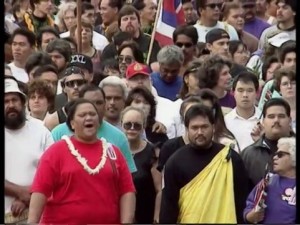Taro grower and Native Hawaiian practitioner Jerry Konanui works to propagate and save from extinction the numerous varieties of kalo (taro), a staple of the Hawaiian diet. Jerry’s mission is also to protect kalo, revered as the elder sibling (Haloa) of the Hawaiian people, from the risks of genetic engineering.
Produced and directed by Puhipau and Joan Lander of Nā Maka o ka ʻĀina
To support Nā Maka o ka ʻĀina’s digital archiving project, please visit their website.
1 Comment
-
I loved this video. Uncle Jerry knows what heʻs talking about. Now days everyone takes and does not give back. People only care about money and are not worried about future generations to come. Itʻs sad “Go Uncle Jerry”




